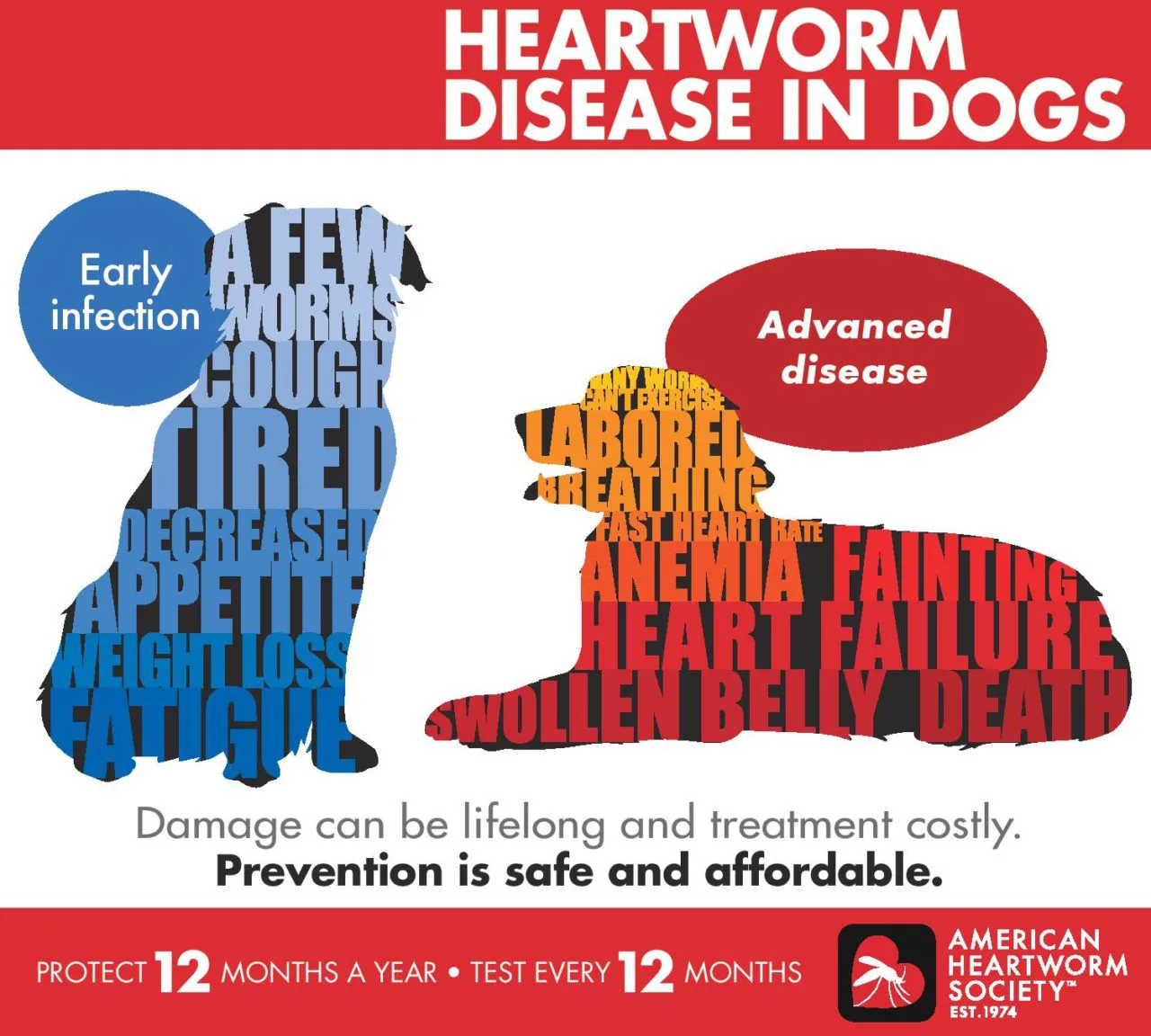April is National Heartworm Awareness Month (NHAM), and that means it’s time for us to do our duty and improve awareness by educating our readers about this potentially devastating disease. Whether you own a dog or just love dogs, we hope you’ll use this information to continue our efforts and benefit health and safety for all beloved dogs.
What Causes Heartworm Disease in Dogs?
Heartworm disease, known scientifically as Dirofilaria immitis, sounds a bit like something out of a horror film about aliens; it’s a small parasite that dogs contract through mosquito bites. Once bitten, tiny microfilaria shaped like microscopic worms enter the bite zone, filtering into the bloodstream. From there, they travel to the heart, or sometimes the lungs and arteries, where they grow, develop, mate, and increase in population.
Heartworm populations often grow slowly and insidiously, with dogs showing few symptoms until there is serious, irreversible damage to the same three major body systems. Even when dogs do become symptomatic, symptoms are very often confused for other illnesses like kennel cough. That’s because the most common signs of heartworm are a mild persistent cough, activity-driven fatigue, low appetite, or mild to moderate weight loss.
With enough time and a severe enough infection, heartworm causes heart failure, leading to extreme swelling and canine cardiovascular collapse. At this point, treatments like pharmacological or surgical intervention may or may not be effective. This is also why treating heartworm preventative is so important.
NHAM may be almost over, but we still have a few things to say on the subject. Moreover, we want to take this time to highlight what we believe are five of the most important takeaways. From various treatment options of official American Heartworm Society recommendations, the next few sections will provide you with the most critical, need-to-know information.
How Is Heartworm Disease Spread?
Although heartworm disease isn’t technically contagious, it takes just a single bite to infect your dog. And mosquitoes are found indoors and in swampy areas the moment temperatures rise, regardless of the season, so it isn’t safe to assume you can stop treatment in the winter. Furthermore, stopping treatments in the fall under the assumption that exposure will stop could result in an infection having the opportunity to take hold later in fall. By spring, your pup could be a very sick dog.
The AKC reports that heartworm is found in all 50 states, including those who experience a stereotypical winter and those that don’t. No matter where you live, or even how cold it gets in the winter, it’s better to treat your dog preventatively year-round.
Think it’s okay to skip treatment because there hasn’t been any heartworm disease cases reported in your area for some time? This is a risky mindset. Remember that just because you aren’t hearing about them, doesn’t mean they aren’t occurring. Many cases of heartworm go unreported and undiagnosed.
How Do Heartworms Affect Dogs?
What’s the risk of skipping heartworm treatment? You might be surprised to find out that even low-grade infections that respond to treatment quickly can leave your dog with permanent damage to the heart, arteries, lungs, and other tissues in the body. That’s because heartworms slowly cause tissues to erode where they take hold, leading to necrosis, and in some cases, secondary infections.
But the biggest risk lies in the fact that heartworms are often a silent killer. They take around six months to grow to adult stage; this is about when most dogs start to experience significant symptoms. By then, the worms are deeply embedded in tissue and exploding in population. Heart and lung tissues respond by swelling and introducing inflammation in an attempt to push out the parasite; this can be painful and cause damage to tissues all on its own.
Coincidentally, six months is around the time period for most real winters in the northern USA. The possibility for dogs to harbor infections all winter until it’s too late is another good reason to keep medicating year-round.
Heartworm Prevention Is Recommended Year-Round
There’s a propensity for some dog owners to feel that they can skip yearly vet visits if their pet seems healthy and well. Unfortunately, this isn’t logical; so many diseases (including heartworms) can fly under the radar until it’s almost too late to treat them. Regular vet visits and early intervention significantly reduces damage and improves prognosis.
Whether medicated or not, it’s wise to have your dog tested for heartworms at every yearly appointment. Your vet can run this test easily and quickly right in the office with a simple blood draw.
Yearly vet visits can also help you stay on top of other potential conditions as your dog ages, ensuring you have as many years with her as possible.
Heartworm Treatment Options
If your dog is diagnosed with heartworms, you may feel scared, worried, or unsure about how to proceed. Rest assured that veterinary medicine does have many options for treating these nasties; the biggest key is to start treatment as early as possible to prevent damage and difficulty in effective treatment.
Have a dog that loves treats? Your vet can give preventative medications in treat form. Dogs who aren’t food-motivated may do better with a pill, while still others do best on liquid medications. And some are simply too wiley and will refuse all medication; there are topicals available for these scenarios.
Dogs who have heartworm already also have a number of options available to them, but treatment does become significantly more risky and more complex. That’s because microfilariae significantly weaken the heart, and even the process of treating heartworm can raise the risk of heart attacks or heart failure because of the heart’s weakened state.
A word of caution: treatment is risky, but it does not mean you shouldn’t treat your dog. Side-by-side, the risk of untreated heartworm infections is much higher than the risks associated with treatment.
Heartworms, Other Internal Parasites
There’s an extra bonus associated with treating heartworm preventative year-round you should be aware of. Nearly all of the medications used also treat your dog for other parasites, like fleas, ticks, roundworms, and hookworms. These parasites can cause significant struggles for your pup (whether or not he or she has heartworm at the time or not).
Here’s a few examples. Flea bites can cause allergic dermatitis (intense itching and redness with or without secondary skin infection). Tick bites can produce Canine Lyme disease, and in some cases, a potentially-fatal paralytic condition caused by neurotoxic enzymes found in tick saliva. Hookworms and roundworms can cause damage to the bowel and cripple digestion, leading your dog to become malnourished and extremely sick.
What matters most in this conversation is that you are proactive about your dog’s health. Whether it’s roundworms, heartworms, or even just age-related osteoarthritis, prevention is worth far more than just a pound of cure. See the vet early; see the vet often. And if you have concerns, speak with your breeder or vet about how to proceed as soon as possible.

